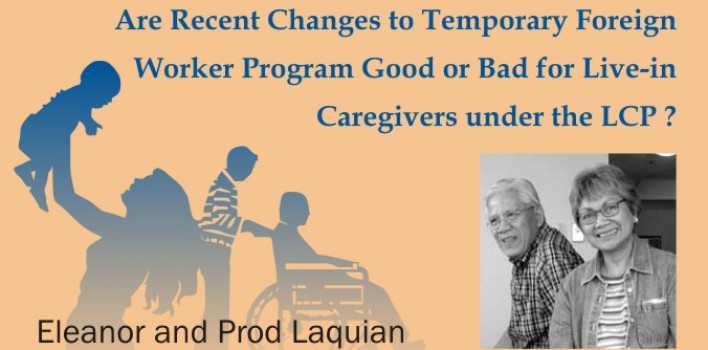Are Recent Changes to Temporary Foreign Worker Program Good or Bad for Live-in Caregivers under the LCP?
The Citizenship and Immigration Canada (CIC) made regulatory changes to the Temporary Foreign Worker Program (TFWP) effective April 1, 2011. Are the changes a boon or a bad April Fool’s joke on Filipino live-in caregivers which make up about 94% of all caregivers in Canada, 98% of whom are female?
The TFWP changes include: (1) a more rigorous assessment of job offers; (2) a two-year prohibition from hiring temporary foreign workers for employers who fail to meet their commitments to workers regarding wages and working conditions; and (3) a four-year limit on their length of stay in Canada after which they must leave the country and wait another four years before they may return for temporary work again.
CIC claims that these changes are “improvements” to protect workers against exploitation and ensure employers’ accountability. On paper, the changes appear to benefit TFWs and LCP caregivers who are classified temporary workers until they become permanent residence. But will more rigorous assessment by government really weed out fraudulent job contracts. Will the two-year penalty truly make abusive employers toe the line?Canada has admitted temporary foreign workers (TFWs) since the 1880s to work on the railroads, for example. Likewise, at present, TFWs are admitted to the country under specific programs that include: (a) the Seasonal Agricultural Worker Program that brings in workers from the Caribbean and Mexico for eight month contracts; (b) the Live-in Caregivers Program (LCP); (c) the Low Skilled Worker Program that admits TFWs with at least a high school education; and (d) the High Skilled Worker Program that applies to managerial and professional occupations.
Until 2007, the number of TFWs has always been smaller than immigrants who come in as permanent residents. In 2008, however, for the first time in history, Canada admitted more TFWs than permanent residents – a total of 192,519 compared to only 149,072 permanent residents. This major shift in Canadian immigration policy has serious implications for other newcomers to Canada, especially live-in caregivers under the LCP.
Why are new CIC Regulatory Changes to TFWP Bad News for LCP caregivers?
The Ontario Council of Agencies Serving Immigrants(OCASI) pointed out that “the changes punish workers rather than protect them.” According to OCASI, the monitoring system to uncover cases of abuse set up by Human Resources and Skills Development Canada (HRSDC) in 2009 is “purely voluntary and ineffective.” It recommends a mandatory system that prosecutes violators. Another immigrant group asserted that a monitoring system may work with recruiters and employers handling many TFWs for employment in businesses like Tim Horton’s, McDonald’s Denny’s and some hotels. However, live-in caregivers have individual or family employers. It is costly and labour intensive to set up a system to monitor thousands of individual employers all over Canada. Besides, some caregivers may choose to endure abuse by employers rather than delay their application for permanent residence by complaining which may result in being fired from their jobs.
When the LCP was started in 1992, it offered permanent residence as an incentive to attract foreign caregivers to these humble live-in jobs where there was a great demand at the time. Because Canada is the only country in the world that grants permanent residence to caregivers, thousands came to Canada under the LCP. However, in 2002, the CIC allowed TFWP to admit temporary caregivers as well. Unlike the LCP caregivers, these TFWP caregivers are not entitled to apply for permanent residence unless guaranteed a permanent job by employers within four years of their stay.
LCP supporters are concerned that the entry of TFWP caregivers will undermine their program. They fear that the LCP may be de-emphasized or even phased out since TFWP caregivers are willing to provide caregiver services without the benefit of permanent residence. This makes all caregivers more vulnerable to maltreatment and abuse because of the temporary nature of their jobs and status thus making CIC’s so called “improvements” negative.
Canada’s Immigration Policy Regresses under Harper
Historically, Canada’s immigration policy has wrestled with two key questions: Should immigration be humanitarian and foster Canadian national development or should it be utilitarian and simply respond to the country’s human resources needs? For the most part, Canadian policy has been to bring in immigrants as potential citizens who can contribute to nation-building. It is founded on the principles of multiculturalism and respect for basic human rights and has been a unique model for other countries and the envy of many peoples all over the world.
In 2006, however, when the Harper-led Conservative Party came into power, it started changing Canada’s immigration policy to conform to a pragmatic and market-driven neoliberal policy. Through the TFWP, the government brought in more low-skilled workers who may or may not qualify for permanent residence. These workers are completely dependent on their recruiters and employers who dictate their terms of employment as well as their entitlement to government services through individual contracts.
One palpable effect of the 2006 immigration policy changes has been the rapid increase of TFWs admitted to Canada.In 2006, there were 160,908 TFWs in the country. The numbers increased to 283,096 by 2010. CIC data show that about 150,000 TFWs are admitted to the country each year; about 10,000 of these are live-in caregivers including those under the LCP. The number of family sponsorship has also been reduced by about 25% by order of Harper’s Conservative government.
While the number of TFWs has been increasing, caregivers coming under the LCP have been decreasing. CIC data show that whereas caregivers under the LCP progressively increased from 2,684 in 2000 to 13,775 in 2007, the numbers have declined since. In 2008, the number of LCP caregivers declined to 12,882; this went down further to 9,816 in 2009 (data for 2010 are not available but are likely to confirm this downward trend).
Perils of an Enhanced TFWP
Since the passage of the LCP in 1992, there have been some demands for its revision and at times even downright abolition because of reported cases of abuse and exploitation by agents, recruiters and employers and the maladjustment of caregivers’ children due to many years of separation. CIC has made a number of changes in the implementation of the LCP but expressions of dissatisfaction continue with some caregivers even demanding “landed status” on arrival. In the light of continued criticisms of the LCP, it is worth asking if the caregivers’ protests have backfired. Are the recent CIC regulatory changes to the TFWP the Harper government’s response to LCP caregivers’ demands for “landed status now” and other benefits?
There may be other negative implications of the CIC changes in the TFWP. First, if the trend of admitting more TFWP caregivers continues, it is likely that a weakened LCP will be kept merely for window dressing while TFWP caregivers are hired to fill the bill. After four years, the TFW caregivers will be thrown out like so many used disposable diapers and replaced with new ones.
Second, the continued hiring of TFWs to work in Canada for only four years runs the risk of increasing the number of illegal migrants or TNT (Tago Nang tago or Takbo nang takbo– meaning “Run and Hide”) a Tagalog slang for “on the run.” The danger of such a situation is already seen in violent cases involving overstaying “guest workers” in Europe and the growing intolerance of immigrants there and the millions of “undocumented aliens” in the U.S. who had been driven underground and are costing the government millions of dollars to find and deport or accommodate. In Vancouver, a number of TFWs are already in trouble. To help them, MOSAIC and Access Pro Bono have launched a TFW Legal Clinic held every Monday from 7 to 9 pm at MOSAIC on 1720 Grant Street, Vancouver.
Finally, the shift in Canadian immigration policy from a humanitarian, kinder and gentler way of nation-building to a more utilitarian system focused on human-resources-needs and the pursuit of wealth for private gain is a negative development. The recent CIC regulatory changes to TFWP which put workers under the mercy of their employers for four years and then allow these same employers to discard them after use, like some “disposable old appliances,” is a step backward.
 Canada
Canada












